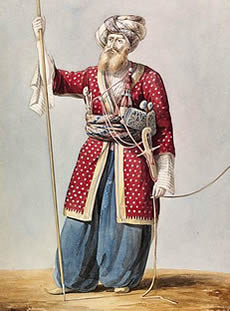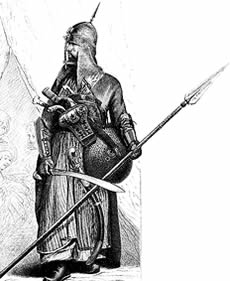World History
The Mamluks ruled Egypt from the middle of the 13th century to 1517. The first 24 Mamluk sultans were called the Bahri (river) rulers. In 1382, they were followed by the Burji (tower) Mamluks, so called because they had been quartered in the towers of the Citadel fortress overlooking Cairo. The Mamluks, mostly of Turkish and Mongol origins, were slaves and professional soldiers.
They were purchased by other former slaves as young boys in the slave markets in Syria and Egypt and educated as a professional military caste. With the completion of their education they were freed and given full military regalia and land to pay for the upkeep of the equipment and horses.
The Mamluks were notoriously disputatious and constantly fought among themselves for succession to the throne. Since there was no principle of hereditary monarchy, any Mamluk could hope to become the ruler if he could overthrow the current sultan.
As a result, the average reign of a sultan was only six years. Mamluks married within the caste to the sisters and relatives of other Mamluks. Their society was based on a feudal hierarchy of allegiance of a vassal to a lord.
Recent converts to Islam, the Mamluks emphasized their rule as Muslims, even though many of them were not personally particularly devout. They allowed the exiled Abbasid caliph from Baghdad to reside in Cairo but successive caliphs exercised no real power.
The Mamluks encouraged metalworking, book binding, and textile industries. But Mamluk attempts to monopolize the trade on luxury goods, coupled with high taxes, discouraged many foreign and local merchants.
As great builders and patrons of the arts, the Mamluks encouraged scholars, including renowned historian Ibn Khaldun, to work in Cairo. Under the Mamluks, Cairo became a major intellectual and artistic center and grew into arguably the largest city in the region.
The Mamluks built hospitals, caravan-saries, public fountains, and massive mausoleums for their families. The mausoleum of Sultan Qaitbay (reigned 1468–96) was particularly impressive. Much of medieval Cairo dates from the Mamluk era.
The Mamluk sultan Baybars (reigned 1260–77) drove the crusaders out of the eastern Mediterranean and repelled major invasions by the Mongols. A wily politician, Baybars also established alliances with potential enemies of Sicily, Seville, and the Turks.
The Black Death (plague) in 1340 reduced the population throughout Mamluk territories; in Cairo alone over 25 percent of the people perished. They were further weakened by Timurlane’s destruction in Syria. The expansion of Portuguese trading outposts along the African and Indian coasts led to mounting economic competition and as they lost control of trade from the east, the revenues from commerce declined.
In addition, constant disputes over succession weakened Mamluk authority and made them vulnerable to outside attacks. Their failure to forge a united front contributed to their defeat and the conquest of Egypt by the Ottoman Turks in 1517.
- Al-azhar
Al-Azhar The Fatimids established al-Azhar, one of the oldest universities in the world, in Cairo in 970. Built around a large mosque with an open courtyard surrounded by columned walkways where classes were taught, al-Azhar quickly became one of the...
- Crusades
Crusades In 1095 Pope Urban II incited the Crusades with a speech urging Christian armies to free the holy sites, especially Jerusalem, from Muslim control. The Crusades sparked a fire of religious fervor among thousands of young knights and other Christian...
- Hulagu Khan
Hulagu Khan with his wife In 1251 Mongke Khan, a grandson of Genghis Khan, became the grand khan of the Mongols and convened his three brothers and close relatives in a meeting to divide the vast territories that had been conquered. To his brother Kubilai...
- Ibn Khaldun
Ibn Khaldun ‘Abd al-Rahman Ibn Muhammad Ibn Khaldun was born in Tunis and died in Cairo. The greatest Arab historian, he developed the philosophy of history and laid the foundation of sociology in his masterpiece, the Muqaddima. He was also a politician...
- Ottoman Empire
Ottoman Empire The Ottoman Empire was a centralized absolute regime ruled from the top by the sultan. As in other nomadic and Islamic empires, the Ottomans never developed a legal procedure for accession and this was to be a source of instability and...
World History
Mamluk Dynasties in Egypt
 |
| Mamluk Dynasties |
They were purchased by other former slaves as young boys in the slave markets in Syria and Egypt and educated as a professional military caste. With the completion of their education they were freed and given full military regalia and land to pay for the upkeep of the equipment and horses.
The Mamluks were notoriously disputatious and constantly fought among themselves for succession to the throne. Since there was no principle of hereditary monarchy, any Mamluk could hope to become the ruler if he could overthrow the current sultan.
As a result, the average reign of a sultan was only six years. Mamluks married within the caste to the sisters and relatives of other Mamluks. Their society was based on a feudal hierarchy of allegiance of a vassal to a lord.
  |   |
Recent converts to Islam, the Mamluks emphasized their rule as Muslims, even though many of them were not personally particularly devout. They allowed the exiled Abbasid caliph from Baghdad to reside in Cairo but successive caliphs exercised no real power.
The Mamluks encouraged metalworking, book binding, and textile industries. But Mamluk attempts to monopolize the trade on luxury goods, coupled with high taxes, discouraged many foreign and local merchants.
As great builders and patrons of the arts, the Mamluks encouraged scholars, including renowned historian Ibn Khaldun, to work in Cairo. Under the Mamluks, Cairo became a major intellectual and artistic center and grew into arguably the largest city in the region.
The Mamluks built hospitals, caravan-saries, public fountains, and massive mausoleums for their families. The mausoleum of Sultan Qaitbay (reigned 1468–96) was particularly impressive. Much of medieval Cairo dates from the Mamluk era.
 |
| Mamluk soldier |
The Black Death (plague) in 1340 reduced the population throughout Mamluk territories; in Cairo alone over 25 percent of the people perished. They were further weakened by Timurlane’s destruction in Syria. The expansion of Portuguese trading outposts along the African and Indian coasts led to mounting economic competition and as they lost control of trade from the east, the revenues from commerce declined.
In addition, constant disputes over succession weakened Mamluk authority and made them vulnerable to outside attacks. Their failure to forge a united front contributed to their defeat and the conquest of Egypt by the Ottoman Turks in 1517.
- Al-azhar
Al-Azhar The Fatimids established al-Azhar, one of the oldest universities in the world, in Cairo in 970. Built around a large mosque with an open courtyard surrounded by columned walkways where classes were taught, al-Azhar quickly became one of the...
- Crusades
Crusades In 1095 Pope Urban II incited the Crusades with a speech urging Christian armies to free the holy sites, especially Jerusalem, from Muslim control. The Crusades sparked a fire of religious fervor among thousands of young knights and other Christian...
- Hulagu Khan
Hulagu Khan with his wife In 1251 Mongke Khan, a grandson of Genghis Khan, became the grand khan of the Mongols and convened his three brothers and close relatives in a meeting to divide the vast territories that had been conquered. To his brother Kubilai...
- Ibn Khaldun
Ibn Khaldun ‘Abd al-Rahman Ibn Muhammad Ibn Khaldun was born in Tunis and died in Cairo. The greatest Arab historian, he developed the philosophy of history and laid the foundation of sociology in his masterpiece, the Muqaddima. He was also a politician...
- Ottoman Empire
Ottoman Empire The Ottoman Empire was a centralized absolute regime ruled from the top by the sultan. As in other nomadic and Islamic empires, the Ottomans never developed a legal procedure for accession and this was to be a source of instability and...
